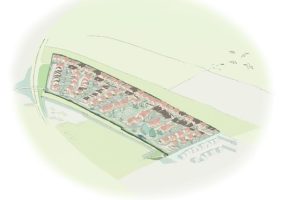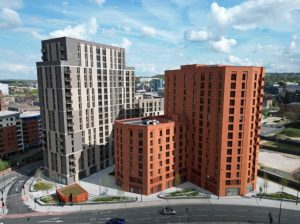Local labour given priority on regional construction projects

YORKSHIRE council leaders are backing a recommendation that regeneration
projects should prioritise local employment across the region.
According to a new report published by the All Party Urban Development Group, councils, health trusts and other public sector agencies should lead by example and promote use of local labour on their own property development projects.
It also suggests that local planners should assess a planning application’s potential to spark employment in a regeneration area and ensure employment commitments through their negotiations with the developer.
The group believes that using Section 106 agreements with developers will ensure that locals benefit fully from regeneration with jobs staying in the area.
This would enable skills and earnings to be reinvested in communities as the projects are built and then used afterwards.
Moreover, the report claims that hiring local people for construction work and developing people’s skills to equip them to work in completed developments would reduce the skills gap and build up employment opportunities.
The report’s recommendations, which include a private sector accreditation scheme that identifies the businesses best at hiring locally, couldn’t come at a more pivotal time.
Figures show that unemployment in Yorkshire stands at 7% after increasing by 13.5% in the three months to December.
Clive Betts, MP for Sheffield and chairman of the All Party Urban Development Group, said that it was crucial during difficult economic times that councils and businesses did everything they could to protect local jobs.
“The planning process provides a prime opportunity for councils to negotiate with private developers, thereby providing good training and job opportunities to local unemployed,” he added.
“Regeneration isn’t just about bricks and mortar; it’s about the legacy and economic certainty of the decades to come. Local people bear the costs of new development, so it’s only fair that they should benefit the most. We just need the government to support this and for councils to want to make it work by showing real innovation in how they plan.”
Jonathan Riley, partner at Leeds-based law firm Pinsent Masons said: “This report will help Yorkshire build on its growing tradition of innovative employment generation through planning agreements.
“In Leeds, developer BAM worked with the council to boost local jobs and skills on its Latitude office scheme, and BAM’s contracting arm did the same in conjunction with Leeds Metropolitan University’s flagship Rosebowl.”
He continued: “Doncaster Council is taking advantage of the growing distribution hub around the town to secure funds from developers for a logistics academy to ensure local people are best placed for new jobs.
“Looking ahead, we are working hard with the Bradford Chamber of Commerce and the Bradford Bulls Community Foundation to forge connections with key stakeholders and place jobs and skills at the heart of the massive Bradford-Shipley Canal Corridor eco-community. Placing jobs and training at the top of the planning agenda now is vital to position us all for better economic times.”
Andrew Carter, leader of Leeds City Council, said that the groundbreaking Latitude Red development showed how mixed-use projects could benefit local communities
He said that working in partnership with developer West End Partnership, the council was able to introduce Construction Leeds – an organisation created to specifically address opportunities for local employment in the construction industry.
“At a time when the construction industry needs all the support it can get, the council and its partners feel that it is vital to take any opportunity to improve training and prospects for local workers,” he said.
“Developments such as this offer the chance to support and nurture the local economy. Leeds City Council is keen to make the best use of such opportunities to ensure the long term vibrancy of the city, helping to support everyone through these challenging times.”
The All Party Parliamentary Urban Development Group is a non-partisan parliamentary body of MPs and Peers committed to progressing urban renewal and sustainable development in the UK.








